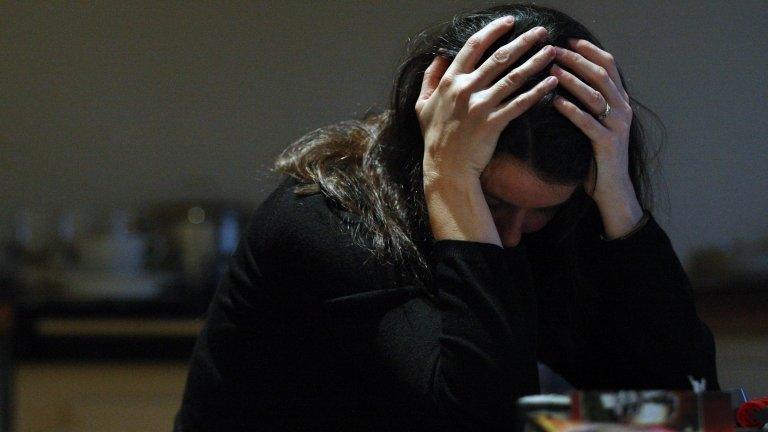Courts to ban cross-examination of victims by abusers
- Published

Domestic abusers will no longer be able to cross-examine their former partners in family courts in England and Wales, the justice secretary is to announce.
Liz Truss will extend a ban which already exists in criminal courts.
She ordered an emergency review into the practice last month following a campaign by victim support groups.
It is part of the Prisons and Courts Bill which will also see major changes to the prison system, including steps to tackle mobile phone and drug use.
Justice Minister Sir Oliver Heald said: "Victims and the most vulnerable are at the centre of our changes, which will help deliver swifter and more certain justice for all."
Ms Truss has been under pressure to reform the treatment of domestic abuse victims in family courts after the President of the Family Division of the High Court, Sir James Munby said they were lagging "woefully" behind their criminal counterparts.
Family court judges are supposed to follow guidance, known as practice direction 12J, which is aimed at stopping an abusive partner from directly interrogating their ex.
But charity Women's Aid has said that professionals in family courts often have an "appalling" lack of understanding of domestic abuse cases.

'Like being tortured'
Over a period of 24 months, Diana, not her real name, was cross-examined in the family courts several times by her abuser.
"I can barely put into words the terror I felt when my ex-husband questioned me directly in the family court," she said.
"At the end of each 'interrogation' I'd hide in the toilets and shake and sob, dousing myself in soap, water and perfume, trying desperately to wash away the experience.
"My ex taunted me about his violent past, name-calling and abusing me all over again. It happened on several occasions over many months. Each time was like being tortured.
"The officials whose protection I had sought watched impassively. Forcing me to re-live the horror of his violence seemed exciting and gratifying for him. He smirked and openly laughed, relishing his audience, the control and my fear.
"The experience re-traumatised me and prevented me from moving on with my life. I think it cemented the impact of the original violence and now it shocks me to think that this happened."
Case study provided by Refuge, external.

In other reforms planned for the court system, the bill will give powers to extend the use of virtual hearings, allowing people to give evidence without meeting their alleged attacker face to face.
Some bail and other hearings will also be conducted via video or phone in future, and booths will be put in court buildings so the public can view the proceedings.
Judges will be able to decide civil claims of up to £25,000 entirely online, if the parties agree.
There will also be a new system for those charged with less serious offences, such as not having a ticket on the train, to plead guilty, accept a penalty and pay it online.
Compensation payouts for whiplash will also be capped at fixed tariffs.
Reform mission
Measures to be announced on prisons come at a time of rising violence in jails, suicides and a number of high-profile disturbances.
The bill will set out in law for the first time that the key function of prisons is to reform offenders as well as punish them.
Other proposed measures include:
New powers to tackle the use of mobile phones in prison
Greater testing of prisoners for psychoactive substances
Prison governors to be given control of budgets for education, employment and health
Governors to also be held to account for getting inmates off drugs, into jobs and learning English and maths
Making the justice secretary personally accountable for the progress in prisons
A strengthened role for HM Inspectorate of Prisons (HMIP) with new statutory powers to intervene in struggling institutions
League tables on how prisons are performing to be made available to the public
Ms Truss said: "I want our prisons to be places of discipline, hard work and self-improvement, where staff are empowered to get people off drugs, improve their English and maths get a job on release."
But shadow justice secretary Richard Burgon said: "The Conservatives' Prison and Courts Bill simply fails to deal with a prisons crisis that has developed on their watch.
"Prisons must reform offenders, but these proposals are an inadequate response to a serious situation."
- Published5 January 2017

- Published30 June 2013

- Published18 February 2017
